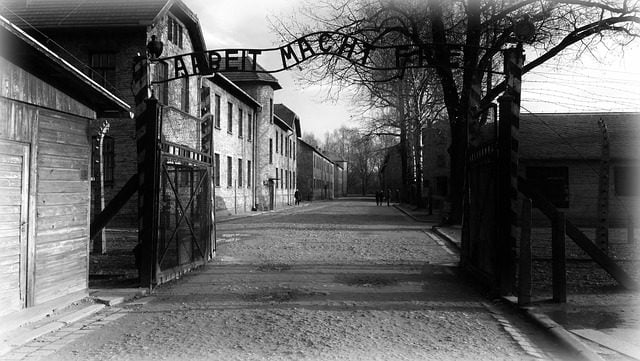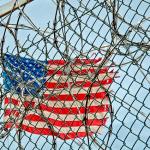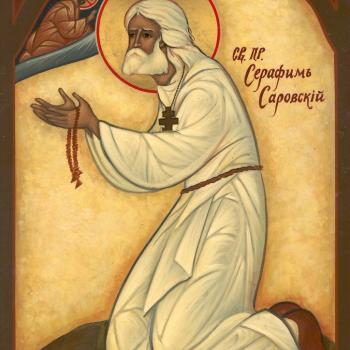
Let’s say that there are no concentration camps in our country right now. Let’s say that’s not where we’re keeping the migrants who keep stubbornly showing up on the Southern border. Let’s go ahead and grant that that word is totally inappropriate, despite what some actual Shoah historians say. Some say it is, after all. Let’s say that these internment camps are another sort of outdoor prison wherein huge numbers of a certain type of human being are concentrated together and not allowed to leave. Not a concentration camp but something else.
What we must remember is that the Holocaust also didn’t start with concentration camps.Concentration camps were called the FINAL solution because they were the end of a chain of events. It started with following a leader who had nothing going for him but a certain type of goofy charisma that many found so ridiculous, they didn’t think he could be a threat. It started with being so desperate to save yourself and your country in dire times that you’d fall in line behind anyone. It started with taking age-old prejudices ingrained in a culture and fanning them into violent hate. It started with propaganda and finger-pointing, painting others, any others, as not worthy of life.
It started with the notion that some human beings are more worthy of life than others– and that some evils are tolerable in the interest of safety and prosperity for the right people.
Wherever you see it suggested that some people are worthy of life, prosperity and peace at the expense of others– it doesn’t really matter if what you’re seeing pales in comparison with the atrocities committed at Auschwitz, Bergen-Belsen, Buchenwald and the other concentration camps. Because you’re looking at the way the concentration camps started.
If you see children deliberately traumatized to punish their parents, babies medically neglected, a prison called “the ice box,” children dying under mysterious circumstances– well, maybe that’s not the experimentation of Doctor Mengele. Maybe it’s less horrifying than that. But it is the kind of thing that has to be normalized in the minds of quite a few people, before we get a Doctor Mengele.
If you hear about prisoners packed like sardines into a cell , that might not be the same as a cattle car. It might be more like something prior to the cattle cars. The ghettos, perhaps. A lot of dreadful things happened prior to the cattle cars.
If you find yourself saying “they should have followed the law,” despite the fact that this is happening to legal asylum-seekers who are following all the laws as well as to illegal migrants– you should realize that what you’re saying is that it’s okay to violate the rights of some human beings, as long as those human beings are law-breakers. And laws can be changed. A government can keep ramping up what they consider illegal, until everyone of a certain race finds themselves illegal no matter how hard they tried to follow the rules. It has happened before. If we don’t have a certain inviolable baseline of the ways in which it’s all right to treat a criminal– if we’ve convinced ourselves that any indignity is appropriate for a law-breaker– then anything is possible.
And if you find you’re listening only to news sources that tell you everything the president does is okay instead of to news that critiques his administration– no, those news sources aren’t nearly as slick as the Nazi propaganda machine. They are laughably oafish by comparison. Yet, here you are believing them. And they are spreading only the news the president would like for you to hear, and that ought to give you pause.
Genocides don’t happen all at once.
But once we accept the premise that it’s okay to hurt some people for a greater good, we have accepted that it’s okay to hurt some people for a greater good. Exactly how much hurt for how little good can quickly balloon out of the proportions you were willing to accept in the first place, and at that point you can’t stop it.
Once we accept that treatment we wouldn’t want visited on our own children is all right for somebody else’s children– that’s what we’ve decided to do, to somebody. The question of how many somebodies, and how severely, quickly snowballs out of hand.
Do you remember when you first learned about the Holocaust? Maybe you were in elementary school. Maybe you visited a museum or saw a documentary on television. Perhaps you fell in love with Corrie Ten Boom or Anne Frank. Maybe you checked Number the Stars out of the library’s Newbery Honor Book section and read it all in one sitting, breathless.
Do you remember imagining what you’d do, if something like that ever happened in your time? Of course you didn’t think it would. But do you remember how brave and generous and sneaky you hoped you’d be, if you had been alive during the Holocaust? Do you remember the list of actions you thought you might take, to protect your friends and neighbors and to foil the government’s plans?
Let’s say that there isn’t really a genocide gearing up at our Southern border. Let’s say it’s something less serious than that. What’s the worst that could happen if you fought against what really is happening? That you were compassionate to some refugees and migrants as Christ commanded you to be anyway?
Let’s say there is a genocide going on right now, albeit in its earlier stages. What would you like history to remember you as having done?
What if you decided to do that? To be that person? To be brave?
What’s the worst that could happen? And would it really be worse than being one of the people who stood by and did nothing– or the people who helped it happen?
Remember, those people didn’t think it was a genocide either. They thought they were being practical and obeying the law, for everybody’s good.
I know what I choose to do.
(image via Pixabay)

















